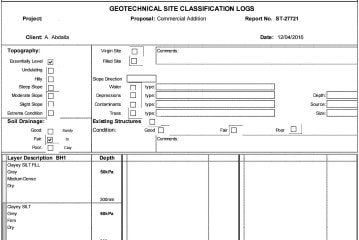Geotechnical investigations are amongst the first investigations undertaken when building a new home or commencing the construction of any structure which is supported by foundations. A Soil Report will provide a site classification for your particular site which will determine the design parameters required to design your project.
A professional thorough Soil Report is vital at the beginning of any construction project as it will no doubt affect the price of your new build. It also aids in the determination of construction works should you like to extend or renovate your property.
Why is soil testing important when building a new house?
The main reason is to understand how 'reactive’ the soil is, and ensure that there aren’t any chemical or physical conditions on the site that might damage your house should they not be considered during design. An example of such matters is the depth of fill soil a property site contains. poor soil reports only end up in poor design and construction in later processes.
Soil reactivity refers to how much the soil on the site is likely to move, expand and contract (normally as a result of changing moisture content) and is graded by class.
The soil bearing capacity tells us the weight the soil can support per unit area, and determines the type of footings or slab subfloor that can be built on your site. If the soil is unstable, then the footings may be to be placed deeper into the ground, or a different type of foundation may need to be used.
What are the different types of soil classifications?
- Class A – Stable, non-reactive: possibility of very little or no ground movement as result of moisture change (often sand and rock sites)
- Class S – possibility of Slight ground movement (often clay sites)
- Class M – possibility of Moderate ground movement (often clay or silt sites)
- Class H – possibility of High ground movement (often clay sites) sub clssed as H1 and H2 sites.
- E – possibility of Extreme ground movement
- Class P – Problem sites: ground movement as a result of moisture change may be very severe.
How is a soil test performed?
Geotechnical engineers use special equipment to drill down into the ground and extract soil. By determining what kind of soil is at various depths, they will be able to classify the site and determine the bearing capacity of the soil.
Extremely helpful and was able to assist us with all of our questions quickly and efficiently.
Ellis James - Melbourne - VIC







